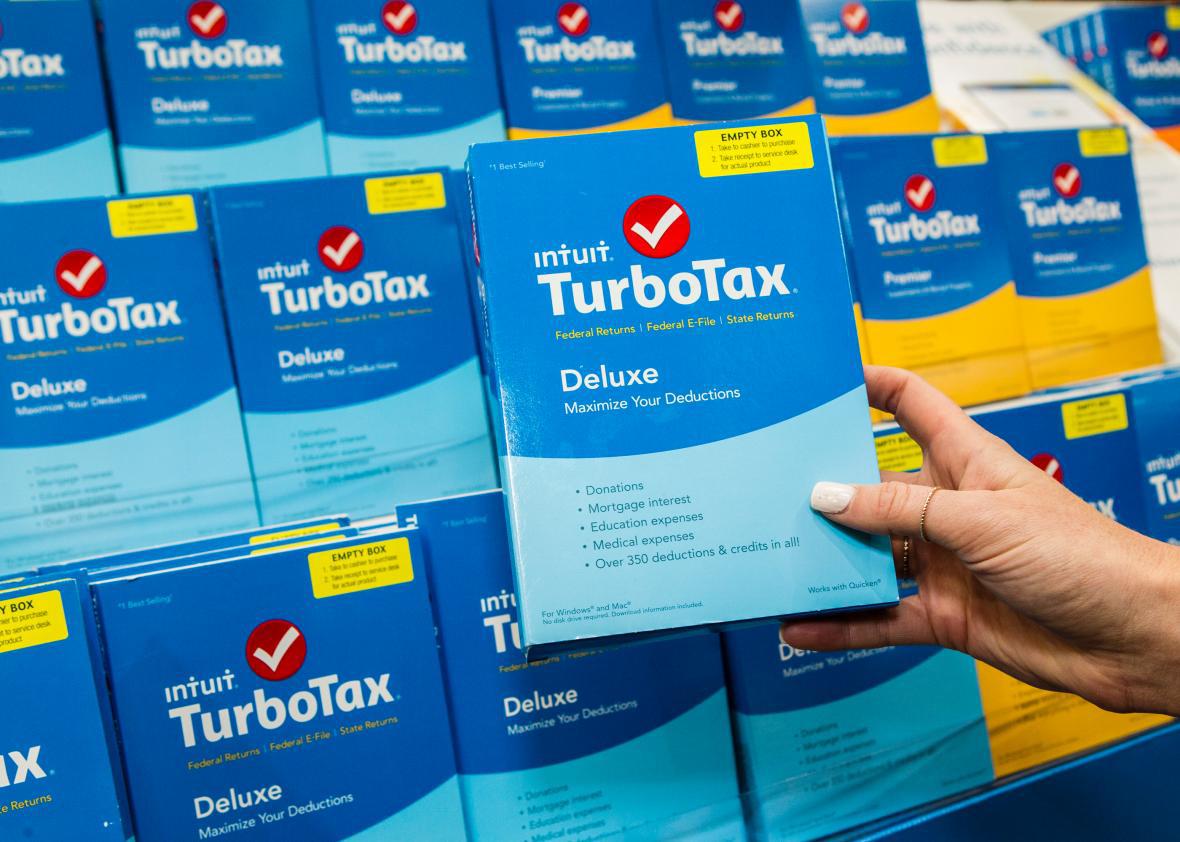“Your life is busy, growing,” goes an ad touting H&R Block’s most recent offering, Block Advisors.* “That means tax complexity.” What the commercial doesn’t say? That H&R Block is determined to keep it that way. So are companies like Intuit and Jackson Hewitt.
It’s not the fault of the Internal Revenue Service, it turns out, that the typical tax filer will spend about 13 hours and between $200 and $300 preparing and filing his or her annual returns, which are due Monday at midnight. It’s not the IRS that makes us so miserable that we’re more likely to die in a car accident the day our taxes are due. Tax day has become uncommonly time-consuming and miserable, and we can assign much of the blame to the lobbying muscle of the tax-prep industry, which has used its clout to stymie efforts to simplify our taxes.
How might we have had it instead? As Liz Day pointed out at ProPublica a few years back, countries including Denmark, Sweden, and Spain mail citizens prefilled forms, with salary and bank info that’s been provided to the government by employers and financial-services institutions. That could have been us! Why it’s not is a perfect illustration of how money buys power in Washington, mowing over common-sense reforms, not to mention the actual law itself.
In 1998, Congress ordered the Internal Revenue Service to implement by 2008 a “return-free” system for people with easy filings, likely something similar to what’s now common in other countries. Even before the legislation passed, the tax-prep industry went on the offensive. If the IRS doesn’t “stay out of our backyard,” a high-ranking H&R Block executive threatened, “we will take it up in Congress,” Accounting Today reported in 1998. He meant it. Since then, H&R Block and its peers have spent millions lobbying Congress—$28 million between 1998 and 2013—in what’s been a very successful effort to keep our taxes tangled.
Instead of a return-free system, the IRS has signed multiple agreements with tax-prep giants that bar it from putting together such a plan itself. In exchange, the tax-prep companies have provided the muscle for a free online service for low-income filers that only about 3 percent of those eligible use, according to a report issued by Sen. Elizabeth Warren last week.
The tax-prep companies have billions of reasons to fight a simplified tax filing system. Market researcher IBIS World says the consumer tax preparation services are a $10.3 billion market, while tax preparation software is another $2.1 billion market. According to the National Retail Federation Tax Returns Survey, 38.2 percent of tax filers will use some kind of software to prepare their returns this year.
And what sort of expertise are you getting when you turn to a tax-prep chain? Not as great as you think. In 2014, the Government Accountability Office studied the issue, hiring mystery shoppers to play the role of would-be taxpayers seeking assistance filing a return from one of the big tax-prep chains. Misinformation was rife. More than one preparer informed a “waitress,” for example, that she did not need to declare tips to the federal government. Almost 90 percent of the returns prepared for the GAO’s testers contained mistakes.
One reason why: Many tax preparers aren’t certified accountants. Only four states—New York, California, Oregon, and Maryland—even require tax preparers to pass an exam and take part in continuing education. When the IRS attempted to mandate similar strictures, courts dinged its regulations, saying the agency had exceeded its authority.
Meanwhile, tax-prep companies keep devising new ways for people to fork over money. Take a product called refund anticipation checks offered by most big box tax preparers. Customers—usually the unbanked or the broke, the sort of people eligible for an earned income tax credit who need every last penny—pay a fee of about $30 or $35 to the tax preparer, who opens a temporary bank account for them. In return, the company agrees to take the money for their services out of the refund check. This sum seems small enough. But the customer is paying for the privilege of enjoying a no-questions-asked short-term loan to pay their preparer. After all, the federal government usually gets refunds back to people within a month. The New America Foundation, calculating the numbers based on a $189 tax-prep fee, came to the conclusion that this represented a short-term interest rate of 414 percent. This is lucrative stuff. The Consumer Federation of America and the National Consumer Law Center estimated the tax prep companies earned $630 million in fees from refund anticipation checks in 2014, and another $195 million in fees for such things as “technology” and “transmission.”
All this adds up. According to the Progressive Policy Institute, the average recipient of the earned income tax credit loses about $400 of his or her refunds to the preparers who helped complete and submit his or her taxes. For some, that’s almost 25 percent of what they received back from the federal government.

Kimberly White/Getty Images for TurboTax
Right now, Warren is stepping up. Last week, the Massachusetts Democrat introduced a bill that would turn the tax world upside down, mandating the government send us returns with our basic information. We could then go online to the IRS’s website and add in itemized deductions like medical expenses and mortgage deductions. Bernie Sanders is among the bill’s co-sponsors, and Hillary Clinton has also signaled her support.
Don’t get too excited. It’s not like others haven’t attempted similar legislation. In the previous session of Congress, for instance, Sen. Jeanne Shaheen and Reps. Bill Foster, Lloyd Doggett, and Mike Quigley all pushed similar plans. You might notice you’re still filling out the same tax return as usual.
Moreover, much like the battles over improving retirement advice and toughening up regs on payday loans, this isn’t a case of Democrats against Republicans. Over the years, Dems including California Rep. Zoe Lofgren (in partnership with Rep. Eric Cantor) have introduced bills that would have explicitly or implicitly forbidden the IRS to proceed with government-prepared returns.
Finally, the right-wing anti-tax establishment opposes the simplified, stress-free tax return. Grover Norquist, the founder of Americans for Tax Reform, believes a simple tax return will lead Americans to ultimately be more accepting of their annual tax bill and less likely to support efforts to reduce the tab. “We want people to be aware of what they are paying and how much it costs. The idea that one of the benefits is to reduce the psychic cost of tax filing reminds me of the argument for the guillotine, which was that it was more humane,” he said in 2005.
Actually, Norquist might be on to something. Almost half of us view the IRS unfavorably, according to the Pew Research Center. Crowds thrill to Ted Cruz’s campaign promise to abolish the Internal Revenue Service. We hate paying our tax bill so much that Gallup reports 57 percent of us think our federal taxes are too high—and that’s a fantastic finding, since approximately 45 percent of us pay no federal taxes at all.
In the meantime, the tax-prep industry continues on. According to market researcher Fluent, half of us who use a tax-preparation software like Intuit’s market leader TurboTax do it because it’s “cost-effective.” If only we knew what it was really costing us.
*Correction, April 18, 2016: This post originally misquoted the H&R Block ad for Block Advisors. It begins, “Your life is busy,” not “You life is busy.”
